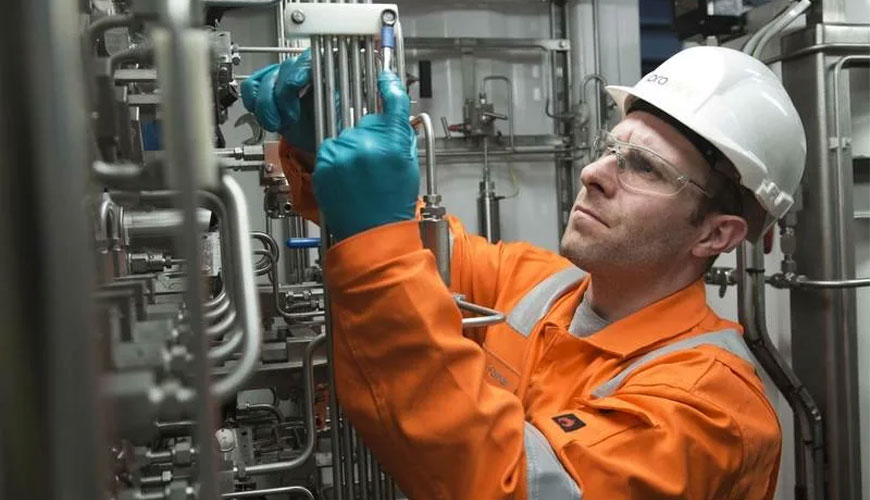

EUROLAB laboratory provides testing and compliance services within the scope of ISO 23936-1 standard. The ISO 23936-1 standard, developed by the International Organization for Standardization (ISO), presents general principles as a whole and provides requirements and recommendations for its selection and qualification, and provides guidance for the quality assurance of non-metallic materials for service in equipment used in oil and gas production environments, such In the event of equipment malfunction, it may pose a risk to the health and safety of the public and personnel, or to the environment.

It can be applied to help avoid costly corrosion failures in the equipment itself. It supplements, but does not replace, the material requirements specified in appropriate design codes, standards or regulations.
ISO 23936-1 addresses the resistance of thermoplastics to degradation in properties that can be caused by physical or chemical interaction with produced and injected oil and gas field environments, and by manufacturing and chemical processes. Interaction with sunlight is included; however, ionizing radiation is outside the scope of ISO 23936-1.
ISO 23936-1 is not necessarily suitable for application to equipment used in refining or downstream processes and equipment. Considered equipment includes, but is not limited to, non-metallic pipelines, pipes, linings, gaskets, gaskets and washers.
Non-metallic materials are used for pipelines, pipes, liners, gaskets, gaskets and washers, among others, in the oil and gas industries. Specifically, the use of pipes and liners will increase significantly in the future. The purpose of ISO 23936 is to establish requirements and guidelines for systematic and effective planning for the reliable use of non-metallic materials in order to arrive at cost-effective technical solutions, taking into account possible constraints due to safety and/or environmental issues.
ISO 23936 will benefit a wide range of industries, from operators and suppliers to engineers and officials. It covers the relevant general non-metallic material types (thermoplastics, elastomers, thermosetting plastics) and includes the widest range of technical experience available. This is particularly important because the topic has not been previously outlined in a technical standard. Coatings are outside the scope of ISO 23936.
ISO 23936 was initiated during work on ISO 15156-1, ISO 15156-2 and ISO 15156-3, which gives requirements and recommendations for the selection and qualification of low alloy steels, corrosion resistant alloys and other alloys for service in equipment. It is used in environments containing H₂S in oil and natural gas production and natural gas treatment plants, where failure of such materials may pose a risk to public and personnel health and safety or the environment.
The fourth part of ISO 15156 was originally intended to cover the selection and qualification of non-metallic materials in the same environment. However, at a later stage it was decided that it would be too limiting to consider only hydrogen sulfide as the corrosive component for non-metallic materials, due to the differences in the corrosion mechanisms of metallic and non-metallic materials, since oil and gas production services other system parameters also apply to non-metallic materials. should be considered corrosive and perishable.
It was therefore decided to produce an independent International Standard covering all system parameters considered relevant for the prevention of corrosion damage to non-metallic equipment in the oil and gas industries. ISO 23936 supplements, but does not replace, the material requirements of appropriate design codes, standards or regulations.
ISO 23936 applies to the qualification and selection of materials for equipment designed and constructed using conventional design criteria for the technical application of non-metallic materials. Designs using other criteria are out of scope. ISO 23936 is not necessarily suitable for application to equipment used in refining or downstream processes and equipment.
Non-metallic materials selected using parts of ISO 23936 are resistant to certain environments in the oil and gas industries, but are not necessarily immune under all service conditions. ISO 23936 places responsibility for suitability for the intended service in each case to the user of the equipment.
Among the services provided by our organization within the framework of material testing services, there are also ISO 23936-1 standard tests. Do not hesitate to contact our laboratory EUROLAB for your testing and certification requests.
To get an appointment, to get more detailed information or to request an evaluation, you can ask us to fill in our form and reach you.